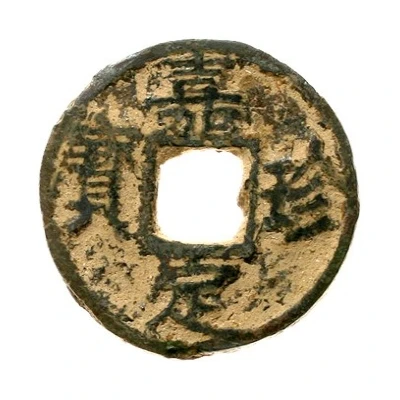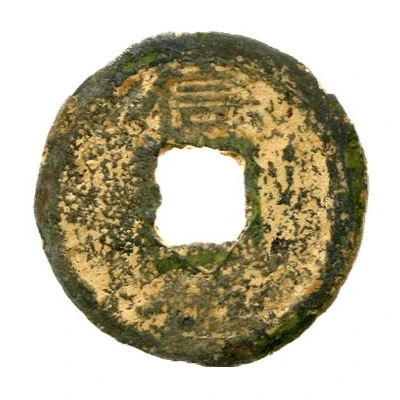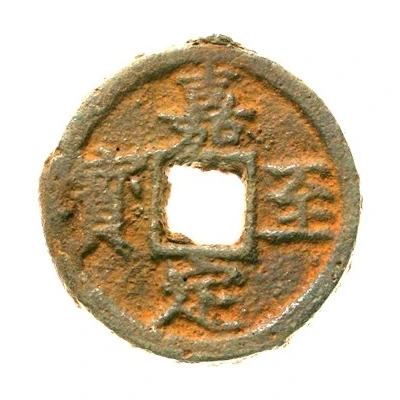5 Cash - Jiading Zhenbao; type 2; Shi; iron ND
| Iron | - | 35 mm |
| Issuer | Empire of China |
|---|---|
| Emperor | Southern Song dynasty › Ningzong (宋寧宗) (1194-1224) |
| Type | Circulating commemorative coin |
| Years | 1208-1224 |
| Value | 5 Cash |
| Currency | Cash (621-1912) |
| Composition | Iron |
| Diameter | 35 mm |
| Shape | Round with a square hole |
| Technique | Cast |
| Orientation | Medal alignment ↑↑ |
| Demonetized | Yes |
| Updated | 2024-10-03 |
| Numista | N#219776 |
|---|---|
| Rarity index | 100% |
Reverse
One Chinese ideogram above and value below.
Script: Chinese (traditional, regular script)
Lettering:
使
伍
Translation:
Shi / Wu
[Uncertain mint] / Value 5
Edge
Plain
Comment
The type 2 Zhenbao coins have two possible mintmarks (Shi and Xin), with both being cast at uncertain mints. With there being five confirmable mints open in Sichuan at this time, and with four of those mints having mintmarks (Fengyuan Mint with Ding, Huimin Mint with Hui, Shaoxing Mint with Li Zhou, and the Old Yidu Mint possibly with Zheng), it is possible these mintmarks come from the remaining mint: Baizhang County Mint / Yazhou Mint.Even so, Shi and Xin seemingly have nothing to do with Baizhang or Yazhou, so it is also possible there were other, uncertain mints open at this time, which cast the coins with these mintmarks.
During the Jiading era, in addition to the regular Tongbao, Yuanbao, and Zhongbao coins, various other currency names are used:
- 安寶 (Anbao; peaceful currency)
- 崇寶 (Chongbao; noble currency)
- 大寶 (Dabao; large currency)
- 封寶 (Fengbao; honoured currency)
- 洪寶 (Hongbao; great currency)
- 隆寶 (Longbao; eminent currency)
- 泉寶 (Quanbao; type 1; wealthy currency)
- 全寶 (Quanbao; type 2; perfect currency)
- 万寶 (Wanbao; uncountable currency)
- 新寶 (Xinbao; new currency)
- 興寶 (Xingbao; prosperous currency)
- 永寶 (Yongbao; everlasting currency)
- 真寶 (Zhenbao; type 1; true currency)
- 珍寶 (Zhenbao; type 2; precious currency)
- 正寶 (Zhengbao; orthodox currency)
- 至寶 (Zhibao; type 1; best currency)
- 之寶 (Zhibao; type 2; the currency)
These all appear to be from mints in Sichuan; however, the exact purpose of these pieces (collectively known as the substitution series) is uncertain.
One possible theory is that, because the Jiading era lasted 24 years and there are exactly 24 coin in this series, a different currency name was used each year.
Interesting fact
One interesting fact about this coin is that it was made of iron, which was a unusual choice of material for coins at that time, as most coins were made of copper, silver or gold. The use of iron suggests that the Empire of China was experimenting with different materials for their currency, possibly due to a shortage of more traditional metals. This coin is a rare example of a circulating commemorative coin made of iron and its unique material makes it a valuable collector's item for numismatists.



